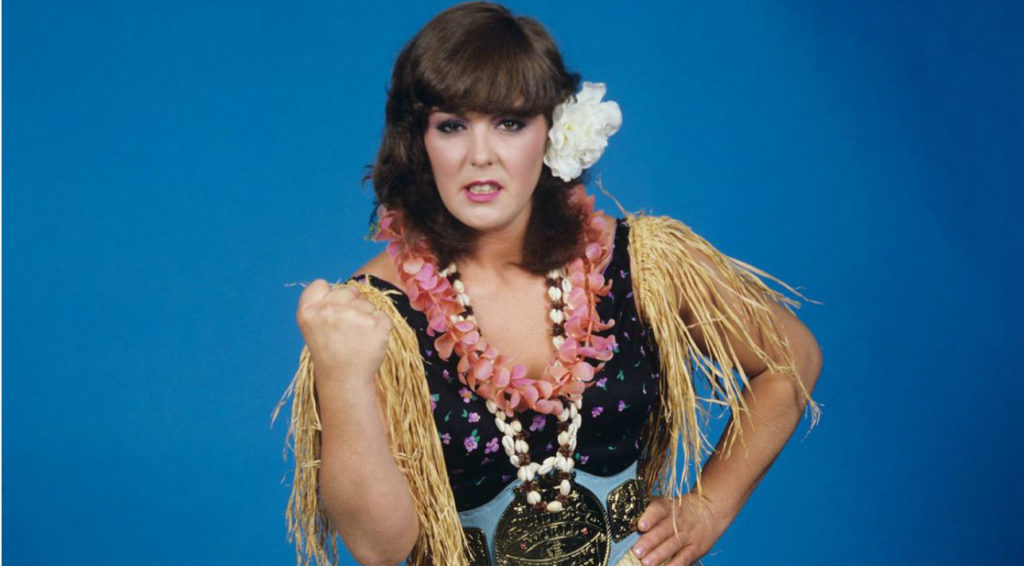Wrestler of the Week: Leilani Kai

RondaRousey.com’s Wrestler of the Week series profiles significant wrestlers from the past and present.
With success in both singles and tag team competition, Leilani Kai was one of the most accomplished female wrestlers of the 1980s. Though women’s wrestling wasn’t often in the spotlight, Kai tended to be
According to an interview with Mojo Thunderbolt, Kai initially connected with pro wrestling when she watched as a young child. She “was connected immediately” and started training under The Fabulous Moolah in the mid-1970s, right after she finished high school. Born Patty Seymour, she was eventually dubbed “Leilani Kai” by Moolah because she thought she looked Hawaiian (she is Caucasian). She then started wrestling for promotions all over the United States.
Kai’s profile grew when she was incorporated into the WWF’s “Rock ‘n’ Wrestling Connection” angle. What started with Lou Albano playing Cyndi Lauper’s dad in the “Girls Just Want to Have Fun” music video grew into a feud between the two as managers, then between Lauper and Moolah with Kai and Wendi Richter as their respective in-ring representatives. At “The War to Settle the Score” in 1985, Kai—with Moolah’s help—defeated Richter to become the WWF Women’s Champion.
The rematch was set for the first WrestleMania event the following month. Kai’s said that prepared for the biggest match of her career by training every day: “Relentlessly… like nothing I had ever experienced.” Then, in the semi-main event of WrestleMania I, she and Moolah were defeated by the good guys.
Kai’s next high-profile feud was in the WWF Women’s Tag Team Championship picture alongside Judy Martin. Kai and Martin, who had previously trained wrestlers together at Moolah’s school, started competing as a pair in 1985. They defeated Velvet McIntyre and Desiree Petersen to win the tag titles later that year, but their defining angle didn’t begin until 1987 after the duo had done some tours of smaller U.S. promotions and in Japan.
Kai and Martin returned to the WWF as the Glamour Girls, with a new look and attitude: blonde hair, gold costumes, and the genius generator of heat in the “The Mouth of the South” Jimmy Hart as their manager. They competed in the first women’s Survivor Series elimination match at the first Survivor Series pay-per-view and started feuding with the Jumping Bomb Angels (Noriyo Tateno and Itsuki Yamazaki). Together, these teams displayed the best of both the North American and Japanese women’s wrestling styles of the 1980s in both straightforward tag matches and their two-out-of-three falls match at the 1988 Royal Rumble.
But though audiences enjoyed this rivalry, it would also mark the end of the Glamour Girls’ time in WWF. The team had a falling out with Moolah when they told her she would no longer receive a percentage of their booking fees, which led to their former mentor going behind their backs to cause them to win back their titles from the Angels at a show in Japan, something the company hadn’t wanted to happen.
WWF’s head booker at the time—Hall of Famer Pat Patterson—didn’t believe Kai and Martin when they told him Moolah had ordered the title change. As a result, what would have been the biggest match of the feud at WrestleMania V was scrapped and the WWF Women’s Tag Team Championship was abandoned, with its legacy not to be picked up until the creation of the WWE Women’s Tag Team Championship 30 years later.
With nothing left for them in WWF, the Glamour Girls joined Ladies Major League Wrestling in 1990, then feuded with Madusa and Bambi in WCW in 1991, then worked for the Ladies Professional Wrestling Association—the spiritual successor to GLOW—until it closed in 1992.
Kai’s biggest days as a solo performer were behind her by this time, but she still had some accomplishments ahead. She returned to WWF in 1994 to unsuccessfully challenge Alundra Blayze for the Women’s Championship at WrestleMania X in 1994. Later in the decade, she wrestled for WCW against Madus and Miss Madness (a young Molly Holly) as “Patty Stone Grinder.” In the 2000s, she worked for the NWA and various indies and later managed other female wrestlers in SHINE.
Though she wasn’t the highest profile wrestler, it’s undeniable that Leilani Kai played an important role in the women’s wrestling scene of the 1980s. On her own and as half of the Glamour Girls, she helped show what female performers were capable of.